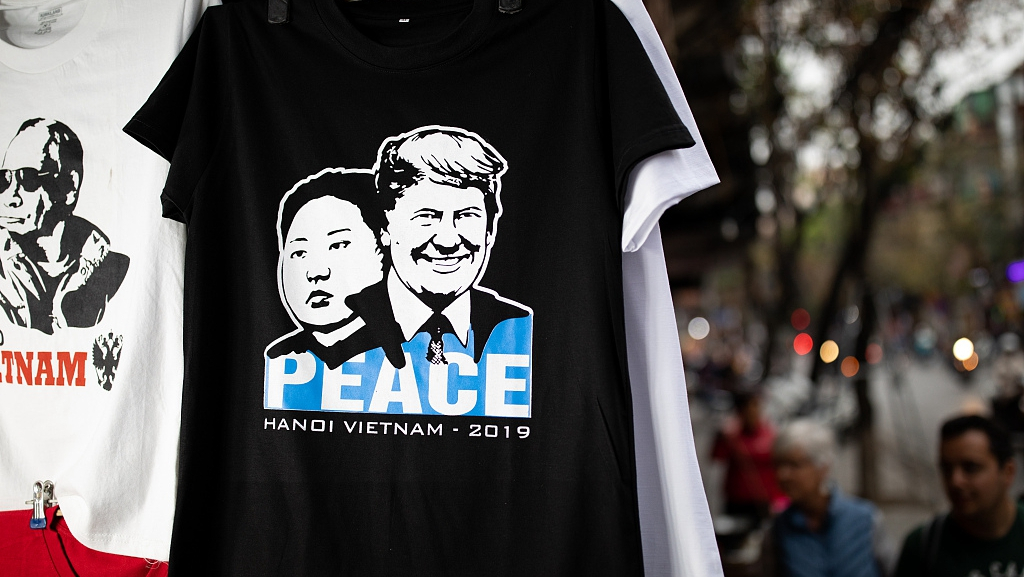Editor's note: The author is a journalist with CGTN. The news analysis reflects the author's views, and not necessarily those of CGTN.
The ill-fated
Korean Peninsula is approaching another crossroads. All eyes are on whether Donald Trump and Kim Jong Un can add any substance to the scaffolding of their outlined agreement after their landmark Singapore summit last year.
Though both leaders are somewhat wayward, Trump seems to be more of the wild card. Most recently, he tempered his expectations for the Hanoi summit, saying "I'm in no rush" at the White House. But he's likely to change at the last minute.
How the U.S. president behaves will likely set the tone for where the final legacy of the Cold War will be headed after a whirlwind year of Kim's diplomatic overtures. And how he behaves is largely determined by how much the president feels beleaguered by his predicaments at home.
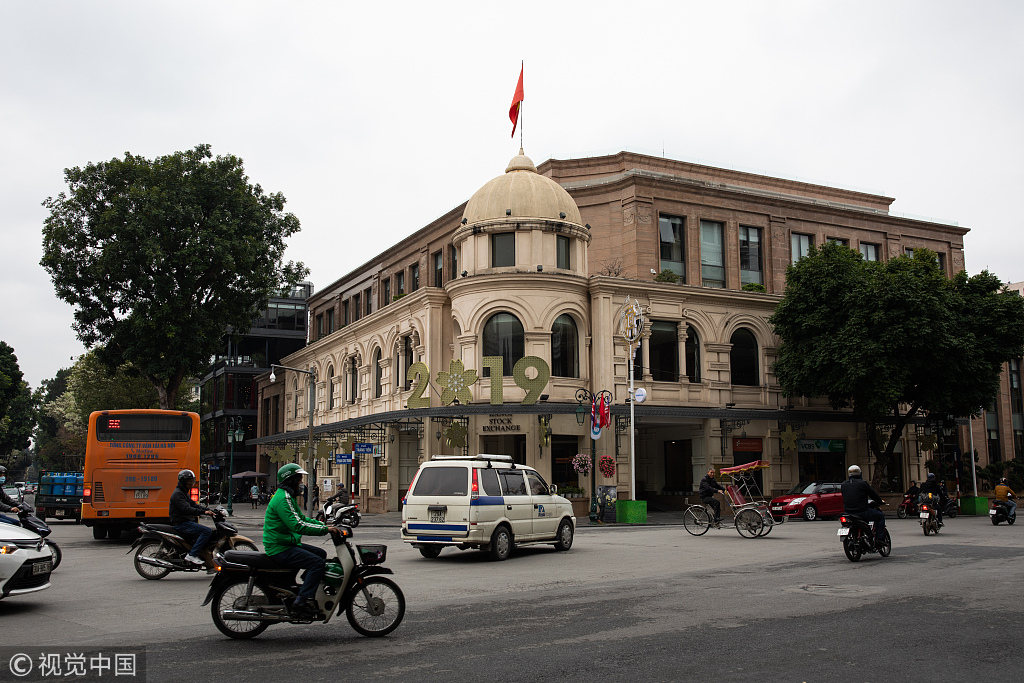
Vehicles drive past the Hanoi Stock Exchange in Hanoi, Vietnam, February 25, 2019. /VCG Photo
Vehicles drive past the Hanoi Stock Exchange in Hanoi, Vietnam, February 25, 2019. /VCG Photo
One dilemma derives from Trump's schism with the Democrat-led House over his long-anticipated border wall. Since the beginning of his presidency, he has advocated for the building of a U.S.-Mexico border wall to keep out illegal immigrants. But the force of his narrative was diminished after House Speaker Nancy Pelosi and other Democrats outlasted him in the partial government shutdown, ultimately avoiding the passage of legislation to fund the border wall. Even rising political stars such as Beto O'Rourke of Texas are speaking out against the U.S. president on the issue.
With assaults from multiple fronts on his core campaign promise, Trump is counting on the success of the summit to appease his constituency.
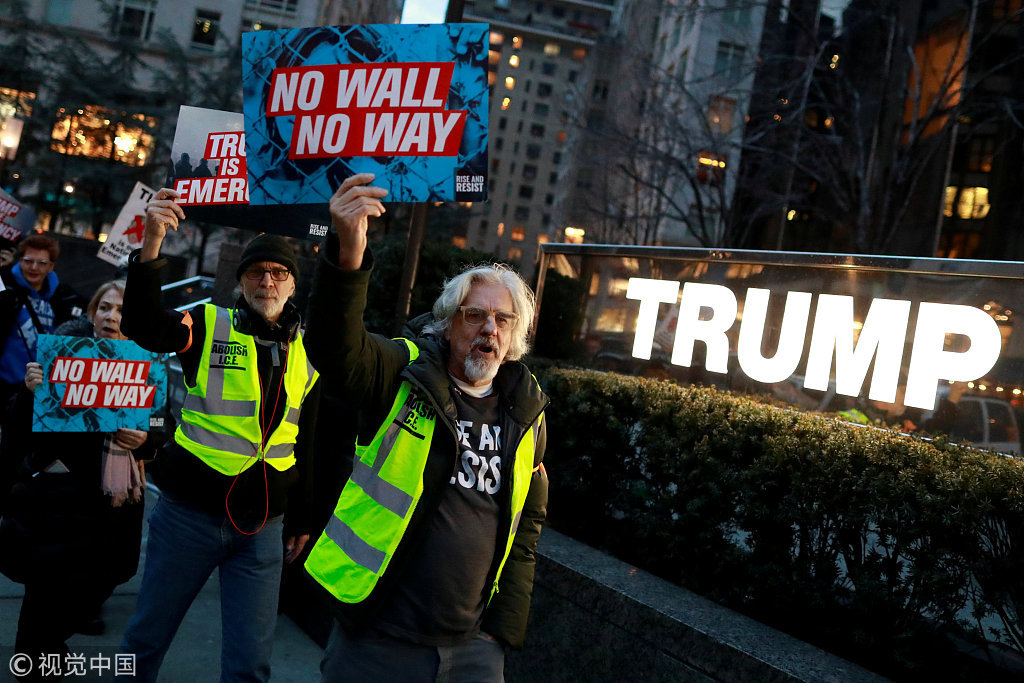
People gather to protest against U.S. President Donald Trump's declaration of a national emergency to build a border wall at Trump International Hotel & Tower in Manhattan, New York, February 15, 2019. /VCG Photo
People gather to protest against U.S. President Donald Trump's declaration of a national emergency to build a border wall at Trump International Hotel & Tower in Manhattan, New York, February 15, 2019. /VCG Photo
A domestic economy looking to enter a downward cycle after a post-recession uptick also concerns the Trump administration. Despite a 3.7-percent drop in the unemployment rate – a record decline since 2000 – labor productivity, the core to sustaining economic growth, remains low. The uncertain fate of the trade war is still a drag on global stocks, especially those from the semiconductor-manufacturing industry.
The Mueller investigation may well deal the heaviest blow to Trump. Although Trump supporters seem to be immune to allegations that he colluded with Russia, the investigation into the possibility is reaching its high note, with reports that Special Counsel Robert Mueller's report will be made public soon.
Many from Trump's inner circle have pleaded guilty to lying to investigators about dealing with Russian lawyers, along with other offenses that have branded them part of a Russian conspiracy to undermine U.S. democracy.
However, like peeling back a banana, Trump still remains untouched, though his closest associates, such as personal lawyer Michael Cohen, and former national security adviser Michael Flynn have fallen from grace.
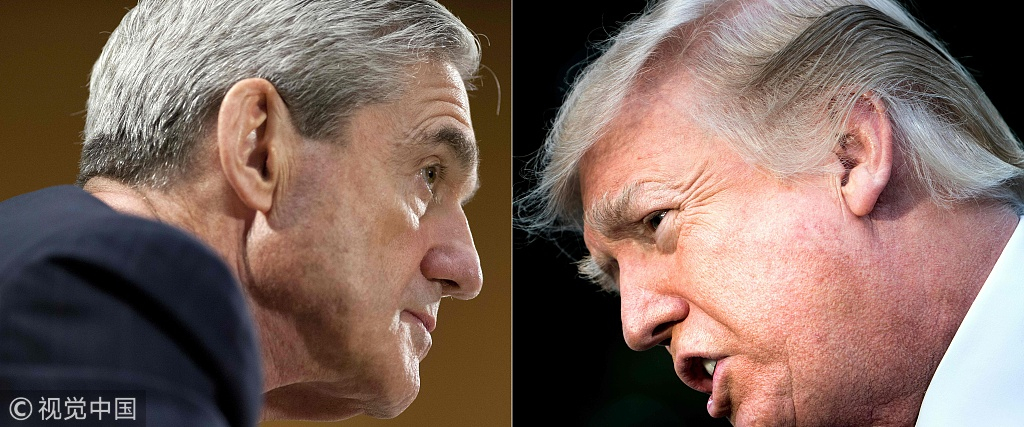
This combination of pictures created on January 8, 2018 shows files photos of FBI Director Robert Mueller (L) on June 19, 2013, in Washington DC and U.S. President Donald Trump on December 15, 2017, in Washington, DC. /VCG Photo
This combination of pictures created on January 8, 2018 shows files photos of FBI Director Robert Mueller (L) on June 19, 2013, in Washington DC and U.S. President Donald Trump on December 15, 2017, in Washington, DC. /VCG Photo
During Trump's stay in Vietnam, Cohen is due to testify before Congress. The possibility of the testimony's salacious details will have to compete with Trump and Kim's high-profile summit.
But if Mueller finds that Trump was personally involved or that he obstructed justice by trying to halt the investigation – possibly through the firing of former FBI director James Comey – then it could set the stage for Democrats in the House to launch the impeachment process, and the Senate will put him on trial to determine whether he should be removed from office.
The impending release of the report may be what concerns Trump the most during his visit to the Vietnam because it could ultimately end his presidency.
Any breakthrough on the Korean Peninsula could give him a temporary boost, but there continues to be a gap between the president and his pro-establishment camp.
Robert Abrams, the top U.S. military commander in the Republic of Korea, said the Democratic People's Republic of Korea (DPRK) remains a threat as the country has "made few, if any, changes to its military posture."
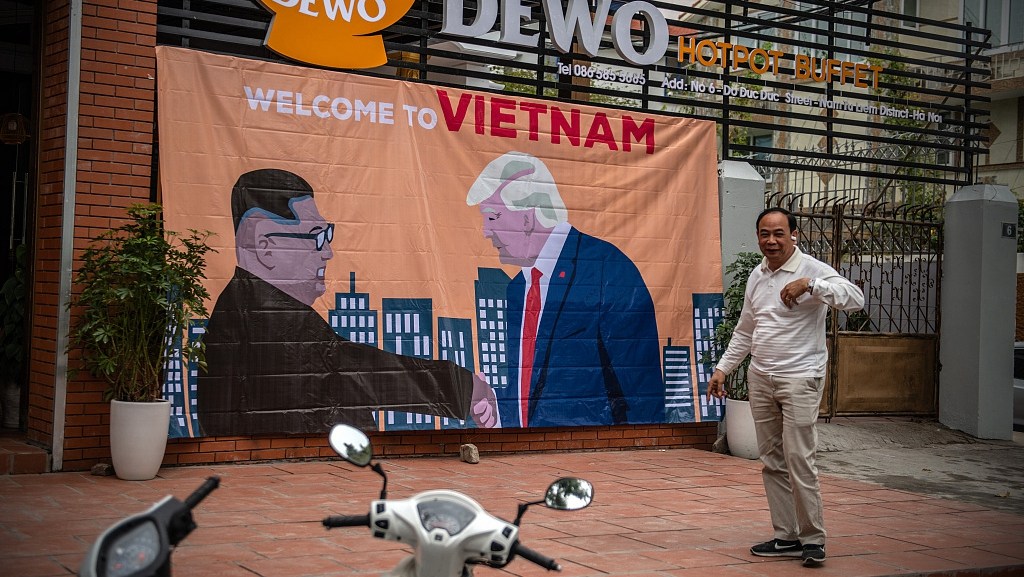
A man pauses by a banner showing U.S. President Donald Trump and DPRK leader Kim Jong Un shaking hands next to the words "Welcome to Vietnam" hung opposite the Marriott Hotel where President Trump is expected to stay in Hanoi, Vietnam, February 25, 2019. /VCG Photo
A man pauses by a banner showing U.S. President Donald Trump and DPRK leader Kim Jong Un shaking hands next to the words "Welcome to Vietnam" hung opposite the Marriott Hotel where President Trump is expected to stay in Hanoi, Vietnam, February 25, 2019. /VCG Photo
That's also the biggest concern of many of the pro-establishment politicians who hold a harsh attitude toward Pyongyang. They, at the core of Washington's political arena, have continued to demand complete, verifiable and irreversible denuclearization from the DPRK before making concessions, which the country describes as “gangster-like.”
The differences between Washington and Pyongyang toward denuclearization have somehow put Trump – who seems to be hankering after a Nobel Peace Prize more than a truly denuclearized peninsula – at an impasse. Therefore, the outcome of the Trump-Kim summit 2.0 may be just as ethereal as the first one in Sentosa.
Nonetheless, neither Trump nor Kim stand to lose big, said Yang Xiyu, senior fellow of China Institute of International Studies. "Therefore the Hanoi summit will probably generate some small results, like a more tangible joint statement than the Singapore declaration, and the opening of liaison offices in both countries to ratchet up ambassadorial-level diplomatic ties," noted the former diplomat engaged in Korean Peninsula issues.
What's more, if the talks go well, a mechanism for regular negotiations may very well be implemented. But reaching a peace treaty soon seems to be far-fetched in this high-stakes process.

